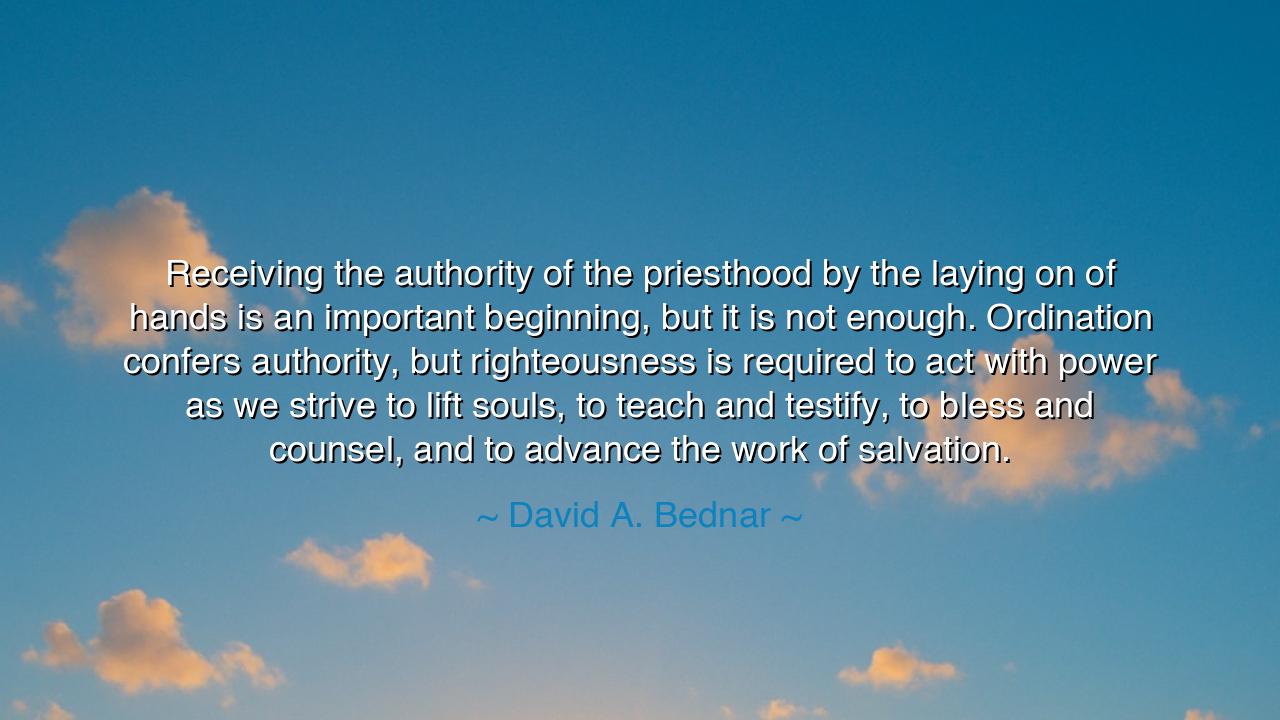
Receiving the authority of the priesthood by the laying on of
Receiving the authority of the priesthood by the laying on of hands is an important beginning, but it is not enough. Ordination confers authority, but righteousness is required to act with power as we strive to lift souls, to teach and testify, to bless and counsel, and to advance the work of salvation.






The words of David A. Bednar shine with the solemnity of sacred calling: “Receiving the authority of the priesthood by the laying on of hands is an important beginning, but it is not enough. Ordination confers authority, but righteousness is required to act with power as we strive to lift souls, to teach and testify, to bless and counsel, and to advance the work of salvation.” In this teaching, he draws a line between the outer ritual and the inner life, between the title bestowed and the virtue required.
For authority alone is like a sword still sheathed—it exists in potential but does not yet cut. Ordination may grant the right to serve, but only righteousness gives the strength to serve rightly. Without purity of heart, humility, and devotion, the priesthood becomes an empty mantle, worn as ornament but devoid of spirit. Bednar’s words remind us that divine power is not bought with hands or titles, but flows only through the vessel made clean by obedience and love.
The scriptures echo this truth. In the Acts of the Apostles, Simon the sorcerer sought to purchase the authority of the Spirit, but Peter rebuked him sharply, declaring that the gift of God cannot be bought, for his heart was not right before the Lord. Likewise, Saul was chosen king of Israel and given authority, but when he turned from righteousness, the Spirit departed, and his crown became a burden. These stories prove Bednar’s teaching: power follows holiness, not ceremony alone.
History bears the same lesson. The medieval church was filled with men who held the titles of bishops and priests, yet many wielded their authority for wealth and politics, not for the salvation of souls. Their failure gave rise to reformers who cried out that true power comes only from righteousness. By contrast, men like Francis of Assisi, who lived with purity and humility, moved nations though they bore little earthly rank.
Therefore, let this wisdom endure: seek not only to be ordained, but to be sanctified. For the hand may confer authority, but only the heart aligned with God can wield it with true power. Bednar calls us to remember that priesthood is not dominion but service, not privilege but sacrifice. To lift, to teach, to bless, and to save requires not only a title but a life of holiness. This is the eternal law—that righteousness is the channel through which heaven’s power flows.






MNMan Nguyen
There’s something profoundly introspective about this idea. It turns the concept of leadership into a moral test rather than a privilege. I’m curious though—how does one measure ‘righteousness’ in this context? It seems deeply personal, yet vital for collective spiritual growth. Perhaps the real message here is that power in service comes from purity of intent, not from the title we hold or the rituals we’ve received.
TL15 Thanh Long
I appreciate how this thought reminds believers that ordination alone doesn’t guarantee spiritual depth. It challenges complacency within faith communities, calling for action that reflects divine character. Still, I wonder how this teaching applies to those outside formal religious leadership—can anyone act with spiritual power through righteousness, even without priesthood authority? Maybe the principle of worthiness transcends structure and applies universally.
TTTuan Tran
This quote feels deeply rooted in the principle of accountability. It’s interesting how it distinguishes between authority and power—as if one is given, but the other must be cultivated. That raises a question for me: can someone hold religious office yet lack spiritual influence if their heart isn’t aligned with God? It seems to suggest that effectiveness in ministry depends more on inner purity than external recognition.
MHvo minh hieu
I find this perspective powerful because it puts the focus on personal integrity rather than status. It suggests that spiritual leadership isn’t about entitlement, but about constant effort and humility. But it also makes me question—how does one maintain that level of worthiness in a world full of distractions and pride? Maybe true priesthood power isn’t just about serving others, but also about mastering oneself first.
PLPhat Le
This message really emphasizes the difference between holding authority and actually living worthy of it. It makes me wonder—how often do people confuse position with spiritual power? There’s something humbling in the idea that divine influence isn’t automatic, but must be continually earned through righteousness. Do you think that’s why some spiritual leaders seem more effective or inspiring than others, even when they hold the same office or title?